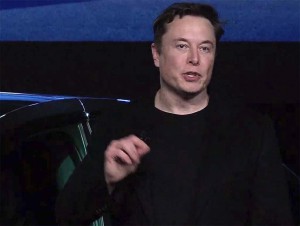
Tesla CEO Elon Musk said now was a good time to explore raising capital, but then suggested the company wouldn't.
Tesla CEO Elon Musk’s passing comment about getting additional money for the electric vehicle maker during the company’s earnings call last week may have had more meaning behind than expected.
During the call, during which the company announced it lost $700 million during the first quarter, Musk was asked about the possibility of raising more money for the company.
“There is some merit to raising capital,” Musk said. “It’s probably about the right time.”
He then suggested it probably wouldn’t happen, adding it was probably good for the EV maker to remain on a “Spartan diet” when it came getting cash from the debt markets. However, the company’s filings with the Securities and Exchange Commission imply something else.
(Tesla’s Musk, SEC ask judge for second extension. Click Here for the story.)
“We continually evaluate our capital expenditure needs and may decide it is best to raise additional capital to fund the rapid growth of our business,” the electric car maker said in the filing. That language is likely a nod to the continued growth of Model 3 production as well as the start up of Model Y as well as the semi truck, which are expected next year.
The company has $2.2 billion in cash and expects capital expenditures of about $2.5 billion to $3 billion annually for the next two fiscal years. Overall, Tesla’s total debt amounts to $10.33 billion as of March 31.
“We may need or want to raise additional funds in the future, and these funds may not be available to us when we need or want them, or at all,” Tesla also said in the filing.
(Click Here for more about Tesla suffering a massive first quarter sales drop.)
In addition to the filings about cash flow, it appears that Musk and the SEC have reached an agreement about how the CEO’s social media posts will be reviewed by the automaker’s legal team.
The agency asked U.S. District Court Judge Alison Nathan to hold Musk in contempt for a perceived violation of their settlement over tweets made by Musk claiming he had secured the funding necessary to take Tesla private — he did not. Some shareholders (i.e. shorts) went crazy when it came to light and the SEC pursued him for fraud.
Fast forward to February and Musk tweets about the company’s expected production numbers, gets its wrong, but corrects it. The SEC claims the tweet violates the terms of the settlement and went to Nathan, who then told the two sides to put their “resonableness pants on” by Nathan, and sort it out.
(To see more about Musk lamenting “excruciating” pressures at Tesla, Click Here.)
According to a court filing, Musk has agreed to submit his public statements about the company’s finances and other topics to vetting by its legal counsel. The problem with the original agreement is that it didn’t offer specific parameters on what types of communications (i.e. subjects) needed to be and the new agreement remedies that problem.
